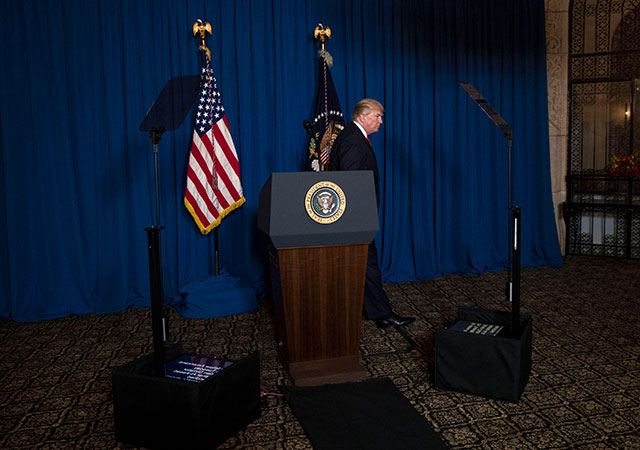Bulletin N° 748
Subject
: MORAL OUTRAGE AND ITS ILLUSIVE TARGETS: Who? What? When? Where? &
Why?
April 20, 2017
Grenoble, France
Dear
Colleagues and Friends of CEIMSA,
The traditional political parties in
the United States –“The Party of Lincoln” and “The Party of FDR”—have for all
practical purposes merged into one Corporate War Party which governs the US
economy today, by manufacturing an ideological hegemony that communicates to
the rest of us, in no uncertain terms, that we are to adapt as best we can for survival in a prolonged period of
austerity. The neo-liberal environment that the US government seeks to maintain
requires popular submission if capitalists are to maximize their investment
opportunities at home and abroad. Censorship and a particular use of language
are of essential importance to produce this submissive population. The writings
of Ludwig Wittgenstein are helpful to understand this linguistic strategy of
domination/subjugation, a sum-zero “game theory” whereby words no longer offer meanings
that correspond to material realities, but rather where the meaning of a word
is determined exclusively by its use in the context of the word game being played, which is
driven by the goal of “winning” silence (i.e. acceptance or submission).
See the four links below for additional information on this
subject :
Ludwig Wittgenstein - The Limits of Thought
https://www.youtube.com/watch?v=XB3OwIV5oro
Published on Feb 13, 2016
This is an introduction to the life, work, and legacy of
the philosopher Ludwig Wittgenstein. There is little doubt that he was a
towering figure of the twentieth century; on his return to Cambridge in 1929
Maynard Keynes wrote, “Well, God has arrived. I met him on the 5:15 train”.
Wittgenstein is credited with being the greatest philosopher of the modern age,
a thinker who left not one but two philosophies for his successors to argue
over: The early Wittgenstein said, “the limits of my language mean the limits
of my world”; the later Wittgenstein replied, “If God looked into our minds he
would not have been able to see there whom we were
speaking of”. Language was at the heart of both. Wittgenstein stated that his
purpose was to finally free humanity from the pointless and neurotic
philosophical questing that plagues us all. As he put it, “To
show the fly the way out of the fly bottle”. He was something of a
philosopher's philosopher. But how did he think language could solve all the
problems of philosophy? How have his ideas influenced contemporary culture? And
could his thought ever achieve the release for us that he hoped it would?
Melvyn Bragg discusses Wittgenstein and these questions with Ray Monk
(Professor of Philosophy at the University of Southampton), Barry Smith
(Lecturer in Philosophy at Birkbeck, University of
London), and Marie McGinn (Senior Lecturer in
Philosophy at the University of York).
&
Ludwig Wittgenstein - In Our Time BBC Radio 4
(audio-42 min)
https://www.youtube.com/watch?v=s9jYaTCn8vw
Published on Dec 24, 2013
From the British Broadcasting Corporation.
&
Ludwig Wittgenstein
Part 1/5
https://www.youtube.com/watch?v=YkMKuuq4Fcs
&
Wittgenstein: A Wonderful Life
(1989)
https://www.youtube.com/watch?v=8BoKjQfMihs
For some of us, the conflictual political cultures inside the United States
today bring to mind scenes from the rise of Nazi Germany. The rise of German
fascism, of course, has its own history, but there seem to be similarities with
what is happening to us in the present crisis of capitalist accumulation, which
has produced all sorts of resistance movements --ranging from slave revolt tactics to revolutioinary strategies-- all of which are accompanied by new repressive military/police
measures. The Hacker counterculture has received widespread attention in recent
years, as have Whistleblowers, Fake News outlets, Blacklisted
social media sources, and that most formidable institution, WikiLeaks.
A “War of Words” and the “Information War” have been declared, as is illustrated
in Vivien Lesnik Weisman’s 2014 documentary film, The
Hacker Wars. The image of agents “trolling” for information,
in a language
game designed to provoke unguarded responses and ultimately abject
submission.
Anonymous
- The Hacker Wars Full Documentary
1h30min
(Warning:
this film contains bigoted language)
https://www.youtube.com/watch?v=jYz9LU8o0mA
&
The Berkeley Street
Violence
April 18, 2017
Meanwhile, back in the material world
of social class struggle, some of us are asking new questions
:
·
Do you think for a minute there would be wars if they were not
profitable for stockholders?
- If western troops actually fighting on the
ground in Third -World countries were inductees from ruling-class families
instead of recruits from the poorest sectors of the working class --if Ivanka and Jared Kushner, Tiffany, Barron, Eric, or Donald Trump, Jr.,
etc… were among the combatants in places like Yemen or Afghanistan— do you
think these conflicts would continue another hour?
Perhaps a long-term historical
perspective can be useful for identifying trends that are otherwise not
recognized. In a discussion of economic growth and the accompaning social class formations
in the period between the 15th & the 18th centuries,
historian Fernand Braudel
writes,
Every advance made by [economic]growth concerns
the division of labor. The latter is a
derivative phenomenon, trailing along behind growth which drags it in its wake
so to speak. But the increasing complexity of the division of labour can eventually be taken as a reliable indicator of
the progress made towards growth, or even as a means of measuring it. . . .
[F]rom the time of Adam Smith, economists
regarded the idea as something akin to Newton’s law of gravity. Jean-Baptiste Say was one of the first to rebel against the
vogue and thereafter the concept of the division of labour
rather went out of fashion. Durkheim wrote of it that ‘it is merely a
derivative phenomenon . . . [which] takes place on the surface of social life,
and this is particularly true of the economic division of labour,
which is but skin deep’. Is this really so? I have often imagined the division
of tasks as something like the intendance –the supply corps which follows the
army and organizes occupied territory. Was the improved organization of
exchange –and by the same token the enlargement of its scope—such a small
thing? The extension of the services or tertiary sector’ –a major phenomenon of
our own times—forms part of the division of labour
&and lies at the heart of socio-economic theories of today. The same is
true of the destructuring and restructuring of social
features which accompany growth, for growth does not merely increase the
division of labour, it reshuffles the cards,
eliminating old functions and proposing new ones, in a process which reshapes
both economy and society. The industrial revolution represents a new and
completely disorienting division of labour,
preserving and refining the mechanisms at work but bringing disastrous
consequences in social and human terms.(p.592, Capitalism & Civilization,
Vol. 3)
Braudel goes on to illustrate how the
division of labor in England evolved sporadically in the 18th and 19th
centuries :
. . . The power-loom, ‘with which a child can produce as much as two or
three men’, was truly a social catastrophe, on top of so many others. Thousands
of weavers were thrown on to the streets. Wages collapsed so drastically that
the starvation rates at which labour could be bought
kept some wretched handloom weavers in work longer than would rationally have
been expected.
At the same time, the new
division of labour, as it urbanized working-class
society, was tearing apart the world of the poor, as they chased after work
which vanished in front to them; it eventually took them to unfamiliar places,
far from the countryside they knew and in the end diminished their way of life.
Living in towns, deprived of the traditional resources of kitchen garden, cow,
and farmyard fowls, working in great factories under the stern gaze of the
overseers, being forced to obey, losing all freedom of movement, accepting
fixed working-hours –all these were immediate effects hard to bear. It meant a
whole way of life and view of the world, to the point of alienation from one’s
own existence. It meant changing diet –eating poor food and less of it. Neil J.
Smelser has given us a sociological and historical
account of the life of the uprooted workers in the new all-conquering cotton
industry. It was many years before working-class society succeeded in creating
protection in the shape of new attitudes and organizations –friendly societies,
cooperative banks and so on. Trade unions would only come later. And it is not
much use asking the rich what they thought of the new town-dwellers. They saw
them as ‘mindless, vicious, quarrelsome and rebellious’ and to make matters
worse, ‘as a rule poor’. What the workers themselves thought of factory labour was expressed rather differently –with their feet.
In 1838, only 23% of the textile workforce were adult
males; the great mass were women and children, who put up less resistance.
Never before has social discontent in England been so severe as in the years
1815-45, which saw the rise in turn of
Luddite machine-breakers, of political radicals, who would have liked to
break down the structures of society, of trade unionism and of Utopian
socialism.(p.595)
He continues his discussion of the
Industrial Revolution with a description of the early industrialist class and
the evolution it underwent between 1750 and 1850 :
The division of labour did not only affect the
base but also –perhaps even more quickly—the top levels of industrial firms.
Hitherto, in Britain as on the continent, the rule had been the indivisibility
of the chief commercial functions –a businessman could be a jack of all trades:
merchant, banker, insurer, ship-owner, industrialist.
When the English ‘country banks’ appeared for instance, their proprietors were
corn-merchants, brewer’s, or wholesalers with many interests, who had been
motivated to set up banks by their own needs and those of their neighbors.
These men with a finger in every pie were found wherever one turned: they were
director’s of the East India Company (naturally) or the Bank of England where
they influenced decisions and exerted patronage, they had seats in the House of
Commons, gradually climbed the ladder of honours, and
were soon governing the country which was already subordinate to their
interests and passions.
But by the late eighteenth and
early nineteenth century, a new type was emerging, the ‘industrialist’, a man
of action who would before long, even before the formation of Peel’s second
ministry (1841), be making an appearance on the political stage, in the House of Commons itself. In the course of acquiring
their independence, these men had broken one by one the ties between
pre-industry and mercantile capitalism. With them there appeared a new form of
capitalism, one that went from strength to strength, firmly based on industrial
production. The new ‘entrepreneurs’ were above all organizers. ‘Relatively
few’, remarks Peter Mathias, ‘were the pioneers of major innovations and
inventions in their own right.’ The talents they claimed to posses;, the tasks
they set themselves, were those of being conversant with new techniques, able
to handle their foremen and workers and lastly having an expert knowledge of
the market so as to be able to direct output themselves, changing course
whenever necessary. They tended to do without the merchant as middlemen,
preferring themselves to supervise the purchase and
transport of the raw materials they needed, to see that it was of the correct
quality and arrived regularly. Since they were producing for a mass market,
they wanted to be &able to assess for themselves the state of the market
and to adapt production accordingly. The Fieldens,
mill-owners in Todmorden, had their own agents in the
United States in the early nineteenth century, who bought supplies of cotton
for the factory. ‘The great London porter brewers bought little malt in the
open market at Mark Lane or Bear Quay [but] . . . employed factor’ in the
barley-growing regions of East Anglia –who were kept on a very tight rein . . . .
These colossal breweries has moreover organized the distribution of their output, not only in London
itself, where they supplied beer directly to half the ale-houses in town, but
also in Dublin, where they had agents. This is an important point: industrial
enterprise was moving towards total independence. Peter Mathias cites the
example of the building entrepreneur Thomas Cubitt,
who emerged as a man of fortune in about 1817, having
become rich during the Napoleonic Wars. His success owed nothing to technical
innovations, and everything to new management techniques: he go
rid of the sub-contractors who had traditionally handled the building trade; he
acquired a permanent workforce and organized his own credit arrangements.
This recently-found
independence was the sign of a new age. The division of labour
between industry and other kinds of business was nearing completion. Historians
tell us that this is the beginning of industrial capitalism, and so it is. But
they also tell us that this is when ‘true’ capitalism begins; I find that a
much more questionable proposition. Is there such a thing a ‘true’ capitalism?(pp.595-598)
Rapid economic growth at the time of
the Industrial Revolution, according to Braudel,
accentuated the division of labor in every sector of English society
:
The composition of every society undergoing long-term growth is
inevitably affected by the division of labour. This
was everywhere at work in England. The Restoration, and in particular with the
Bill of Rights of 1688, marks the beginning of a division with far-reaching
consequences. Another example would be the way a cultural sector (from
education to the theater, newspapers, publishing houses and learned societies)
was gradually emerging as an increasingly independent world. The world of
commerce was also being split apart, a process I have rather too briefly
described. And lastly a modification of the occupational structure was taking
place, along the lines of the classic scheme first defined by Fischer in 1930
and by Colin Clark in 1940, namely that the primary sector (agriculture)
although still dominant, was shrinking as first the secondary (industry) and
then the tertiary (services) sector expanded.
It is true that the distinction
between the three sectors is far from crystal clear, and there are grounds for
uncertainty on the exact borderline between even the first and second sectors
(agriculture and industry sometimes overlap); as for the third, which is an
amalgam of everything, questions could certainly be asked about its composition
or its identification. It is usually taken to include all the ‘services’
–commerce, transport, banking, administration—but is it right to include
domestic servants in this category? Should the hordes of domestic servants (in
1850, this was the second largest occupational group in England after
agriculture, with over a million people) be placed in a sector theoretically
marked by superior productivity? . . .
The development of a services revolution . . . could be seen as a
counterpart of the agricultural revolution in relation to the industrial
revolution.
The place of services in the
economy certainly expanded: it cannot he denied that transport developed; that
commerce gave rise to many new functions; that the number of shops was always
increasing and that they were tending to specialize; that businesses were
expanding steadily if not on the whole particularly fast; that they were
developing their own bureaucracies; that new categories of occupations were
coming into being or taking on new functions: factors, accountants, inspectors,
actuaries, commissioners. Banks had very small staffs it is true, but there
were large numbers of them. The state, with its thousands of administrative
responsibilities was acquiring its own bureaucracy, beginning to swell into an
oversize body. There were more top-heavy state bureaucracies on the continent
admittedly, but the British state was by no means a slim organization, despite
delegating many of its functions. We shall not count the army, the navy or
domestic service in the tertiary sector. But we should unquestionably make room
in it for the growing number of liberal professions –doctors, lawyers, etc. The
latter had begun their way up in the days of [the English statistician] Gregory
King [1648-1712] and were being turned out in droves by the Westminster law
schools. By the end of the eighteenth century all the professions were
expanding steadily and tending to change their structures and traditional forms
of organization.
Did the tertiary revolution in
eighteenth-century England have any effect of industrial takeoff? . . . There is certainly no evidence that the
expansion of a tertiary sector launched growth. But it was unquestionably a
sign that growth was taking place.(pp.598-599)
The dialectical relationships
between current events and long-term history is the leitmotiv of Frenand Braudel’s
research. With this “prologue” to the present episode of our contemporary
capitalist crisis, we look now at some of the historical documents –both social
and political-- which this turbulence has produced in abundance, beginning with
a critique of the present state of “electoral politics” in the context of
Crisis Capitalism, as seen by James Corbett :
Crosswalk Buttons, Voting Booths, and Other Illusions of Control
https://www.youtube.com/watch?v=t5feLuwCYac&feature=youtu.be
The 20 items below offer CEIMSA readers documentation of the historic moment we are now living, and will provide insights into both the repressive actions and the progressive social movements which are now giving shape to our future.
Sincerely,
Francis Feeley
Professor emeritus of American Studies
University Grenoble-Alpes
Director of Research
University of Paris-Nanterre
Center for the Advanced Study of American Institutions and
Social Movements
The University of California-San Diego
a.
Chris Hedges Delivers
the Ultimate Trump Takedown
https://www.youtube.com/watch?v=xLaoJrg80JQ
Truthdig columnist and Pulitzer-Prize-winning
journalist Chris Hedges addresses fascism and the rise of the Trump war machine
in the keynote speech at the "After Trump and Pussy Hats" event in
Vancouver, British Columbia, on March 3, 2017.
Introductions by Cecilia Point of the Musqueam
First Nation and Lee Lakeman of Vancouver Rape and
Women's Relief Shelter.
==========
b.
A Government of Morons

http://www.informationclearinghouse.info/46870.htm
by Paul Craig Roberts
It has become embarrassing to be an American. Our country has had four
war criminal presidents in succession. Clinton twice launched military attacks
on Serbia, ordering NATO to bomb the former Yugoslavia twice, both in 1995 and
in 1999, so that gives Bill two war crimes. George W. Bush invaded Afghanistan
and Iraq and attacked provinces of Pakistan and Yemen from the air. That comes
to four war crimes for Bush. Obama used NATO to destroy Libya and sent
mercenaries to destroy Syria, thereby committing two war crimes. Trump attacked
Syria with US forces, thereby becoming a war criminal early in his regime
==========
c.
MSM Syria Lies Need to
Be Exposed

https://www.corbettreport.com/msm-syria-lies-need-to-be-exposed/
by James Corbett
==========
d.
New Revelations Belie Trump Claims on Syria Chemical Attack

http://www.truth-out.org/news/item/40222-new-revelations-belie-trump-claims-on-syria-chemical-attack
by Gareth Porter
Two unnamed senior Trump administration officials briefing journalists
Tuesday asserted that a Syrian regime airstrike in the city of Khan Sheikhoun on April 4 had deliberately killed dozens of
civilians with sarin gas.
==========
e.
A Critique
of ‘False and Misleading’ White House Claims About Syria’s Use of Lethal Gas
http://www.informationclearinghouse.info/46877.htm
by Theodore A. Postol
Theodore A. Postol
is professor emeritus of science, technology and national security policy at the
Massachusetts Institute of Technology and a specialist in weapons issue.
==========
f.
How Do You Kill 11
Million People?
https://www.youtube.com/watch?v=EH_Izul6J5M&feature=youtu.be
Produced by www.thedrawshop.com
This whiteboard animation shows
what happened when Hitler lied to get elected and people don't care or pay
attention to the lies of their leaders,
until they do care...and at that point, it is too late.
Parts of this video are narrated
by a man who served as a German soldier and a German woman who lived
right by the railroad tracks the cattle trains ran on that carried the Jews
to their deaths.
==========
g.
The Last Country We
“Liberated” from an “Evil” Dictator
Is Now Openly Trading Slaves
http://www.informationclearinghouse.info/46888.htm
by Carey Wedler
It
is widely known that the U.S.-led NATO intervention to topple Libya’s Muammar
Gaddafi in 2011 resulted in a power vacuum that has allowed terror groups like ISIS to gain a
foothold in the country.
==========
h.
Requiem for
the Suicided: Gary Webb
https://www.corbettreport.com/requiem-for-the-suicided-gary-webb/
==========
i.
"I Am Her
Voice": Meet the 10-Year-Old Boy Helping His Mom Take Refuge from
Deportation in a Church

https://www.democracynow.org/2017/4/18/i_am_her_voice_meet_the
A mother of four facing
impending deportation from the United States has taken sanctuary in a Denver
church in hope of gaining a “stay of deportation.”
==========
j.
Now Only Rational Thinking Can Save the World!
http://www.informationclearinghouse.info/46872.htm
by Andre Vltchek
Scenario ONE:
Imagine that you are on board a ship, which is slowly sinking. There is no land
in sight, and your radio transmitter is not functioning properly. There are
several people on board and you care for them, deeply. You don’t want this to
be the end of ‘everything’.
What do you
do?
A) You fix
for yourself a nice portion of fried rice with prawns
B) You turn
on the TV set, which is still somehow miraculously working, and watch the news
about the future Scottish referendum or on BREXIT
C) You jump
into the water immediately, try to identify the damage, and then attempt to do
something unthinkable with your simple tools and capabilities: to save the ship
==========
k.
Trump's Massive Bomb and
Syrian Strike Both Deadly Propaganda Events
http://therealnews.com/t2/index.php?option=com_content&task=view&id=31&Itemid=74&jumival=18870
Vijay Prashad and Paul
Jay ask if the US "mother of all bombs" dropped on Afghanistan and
the missile attack on a Syrian airbase,
are PR events to show Trump and the US military will "fight
without restraint" and "take on Russia"
==========
l.
Breaking
News US led forces has bomb a chemical warehouse April 13 2017
http://thesaker.is/breaking-news-us-led-forces-has-bomb-a-chemical-warehouse-april-13-2017/
==========
m.
Al-Qaeda Suicide Attack
Kills 100+ Children, Women - Whodunit?

http://www.informationclearinghouse.info/46881.htm
by Moon Of Alabama
It is obvious that the suicide attack was committed by al-Qaeda in
Syria. No government aligned element could have crossed into rebel held territory.
The government aligned forces have not committed any suicide attacks while
al-Qaeda as well as Ahrar al Sham have
committed hundreds. This was a "rebel" suicide attack, likely by
al-Qaeda, against government aligned civilian refugees.
But the BBC, CNN and other western media will not tell you that.
CNN called the massacre "a
hiccup". The first Washington report was illustrated
with a pastoral scene of "Shias"
walking in a green field. The write-ups disguise to the average reader on
which side
that vast numbers of casualties of the incident were. They will not
say who the likely culprits are.
Some insinuate, against all logic, that the government did it.
The most recent BBC report on the massacre is one of the worst of
this propaganda genre.
==========
n.
Run for Your Life: The American Police
State Is Coming to Get You
http://www.informationclearinghouse.info/46895.htm
by John W. Whitehead
“We’ve reached the point where state
actors can penetrate rectums and
vaginas,
where judges can order forced catheterizations, and where police
and
medical personnel can perform scans, enemas and colonoscopies
without
the suspect’s consent. And these procedures aren’t to nab kingpins
or
cartels, but people who at worst are hiding an amount of drugs that can fit
into
a body cavity. In most of these cases, they were suspected only of possession
or ingestion. Many of them were innocent... But these tactics aren’t about
getting drugs off the street... These tactics are instead about degrading and
humiliating a class of people that politicians and law enforcement have deemed
the enemy.”
-- Radley Balko, The Washington Post
==========
o.
Snipers and Infiltrators
at Standing Rock: Quashing Protests at Taxpayer Expense

by Joshua
Frank
==========
p.
Bernie Sanders, the Company Man
http://www.counterpunch.org/2017/04/14/bernie-sanders-the-company-man/
by Paul
Street
As I pointed out back in July of 2015, U.S. Senator Bernie Sanders (“I”-VT) is not the independent left politician many
progressives claim he is.
He’s a Democratic Party company
man.
==========
q.
Standard of Living
Declined in Britain Due to Government Austerity

http://therealnews.com/t2/index.php?option=com_content&task=view&id=31&Itemid=74&jumival=18873
A new study shows that the
standard of living in the UK has dropped for the first time since 2014. This is
the result of government austerity
says economist John Weeks
==========
r.
OPERATION
GLADIO/ NATO’S SECREAT ARMIES
http://www.globalresearch.ca/operation-gladio-natos-secret-armies/5404825
==========
s.
Piece of Cake: New Normal of Trump's Foreign Policy

http://www.informationclearinghouse.info/46869.htm
by Pepe Escobar
Here's the Commander-in-chief of the Beautiful Piece of Chocolate Cake
School of Foreign Policy, expanding on his next move regarding North Korea.
"We are sending an armada. Very powerful.
We have submarines. Very powerful. Far
more powerful than the aircraft carrier. That I
can tell you."
==========
t.
From:
"If Americans Knew Team" <contact@ifamericansknew.org>
Sent:
Wednesday, 19 April, 2017
Subject:
Alison Weir speaks in New England May
3-7! Book tour details.

Dear
Francis,
Alison
Weir is scheduled to speak in various cities in the New England area during the
first week of May. We hope you will attend and bring people who are new to this
issue!
If you
aren't located in any of these states, please forward this email to people you
know who live nearby or invite them using the Facebook event pages.

Title: “Will Israel Keep Getting $10 Million
a Day Under Trump?”
Talk
summary: Drawing on her best-selling book, Against Our Better Judgment: The Hidden
History of How the US Was Used to Create Israel, Alison will discuss the
century-long pro-Israel movement in the U.S., media coverage of
Israel-Palestine, the role of Israel partisans in promoting the Iraq War and in
the continued demonization of Iran, and developments under the Trump
administration.
Each
lecture will be followed by a Q&A session, and books will be available for
purchase. If Americans Knew educational materials
on Palestine will be free for attendees to take and distribute.
Below are details for each talk:
Burlington, VT: Wednesday, May 3
6:00 pm
– 7:30 pm, Fletcher Free Library
235
College St, Burlington, VT 05401
Sponsored
by Vermonters for Justice
in Palestine
Keene, NH: Friday, May 5
6:00 pm
– 7:30 pm, Toadstool Bookshops
12
Emerald Street, Keene NH 03431
Sponsored
by Palestine Education
Network (PEN)
Natick, MA: Saturday, May 6
3:00 pm
– 5:00 pm, Natick Library
14 East
Central St, Natick MA 01760
Sponsored by IAK-NE, Metro West Peace Action, & Pax Christi
Boston, MA: Sunday, May 7
11:00
am – 12:30 pm, Community Church of Boston
565
Boylston St, Boston, MA 02116
Sponsored by Community Church of Boston
West Roxbury, MA: Sunday, May 7
6:30 pm – 8:00 pm, St. George Orthodox Church
55 Emmonsdale Rd, West Roxbury MA 02132
Sponsored by The New Generation Club – Boston, The
Syrian American Forum – New England
Facebook pages for each event can be found
here..
If you'd like to bring Alison to your community to give a talk on the
U.S. connection to Israel-Palestine, please write to outreach@ifamericansknew.org
.
In
solidarity,
The If
Americans Knew team
QUICK LINKS
Ø RSVP and invite friends on Facebook
Ø Order Alison Weir's book Against Our Better Judgment on Amazon
Ø Israel-Palestine
Timeline : A list of all Palestinians and Israelis killed since 2000, with photos and information
Ø If
Americans Knew Blog : A compendium of news and analysis about Palestine,
Israel, and related topics
__________________________
ABOUT US If Americans Knew is a nonpartisan educational organization. We are happy to provide information on Israel-Palestine to individuals and groups of all religious, ethnic, racial, and political backgrounds. We support justice, truth, equal rights and respect for all human beings, and we oppose racism, supremacism, and discrimination of all forms.
CONTACT US To invite Alison Weir to give a
presentation on Israel-Palestine, or to learn more about putting up a billboard
in your city, write here. For general comments or questions, write here. Order educational materials
to distribute from our website. Mailing address: If Americans Knew, 5694
Mission Center Rd, Suite 602-710, San Diego, CA 92108. Phone: 202-631-4060